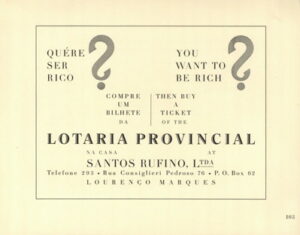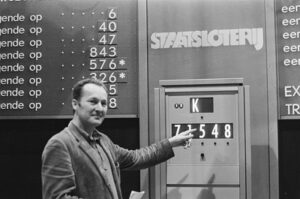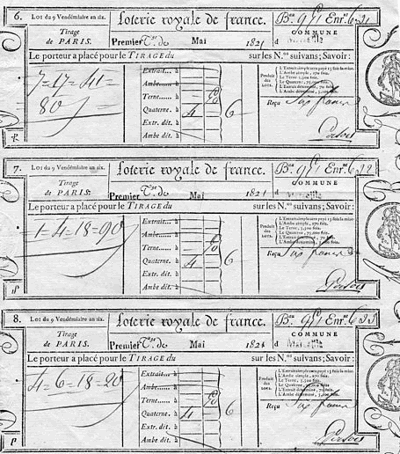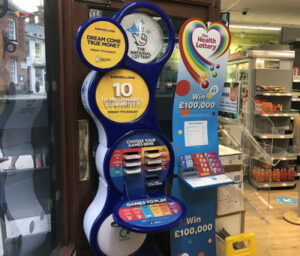 The National Lottery is one of the United Kingdom’s most loved gambling activities. Figures have shown that around 70% of the UK’s over 18s partake in it, equating to 45 million people and this is why it is interesting to wonder how it all started.
The National Lottery is one of the United Kingdom’s most loved gambling activities. Figures have shown that around 70% of the UK’s over 18s partake in it, equating to 45 million people and this is why it is interesting to wonder how it all started.
Lotteries are now almost ubiquitous to the world with games available in most countries, even in some places where other forms of gambling are illegal. But where did very first national lottery take place and how did it spread so widely?
That is what we are going to look into here. The history of lotteries, not just specifically in the UK, but globally. Furthermore, how did these lotteries operate back in the day compared to now?
Huge jackpot winners have been created from the modern-day National Lottery since it became active back in the 90s, but what about the lotteries prior to this? Did they have huge winners that were able to spend money on whatever they wanted? Let’s take a look at the history of the world’s lotteries and find out how they compare to today’s incarnations.
The First Lotteries
 While many people think that the UK National Lottery started things off in 1994, it is actually something that has been recorded in history for centuries prior to this. In fact, the first recorded signs of a lottery ever taking place date back to somewhere between 205 and 187 BC. As it happens, these records display keno slips from the Chinese Han Dynasty, and it is thought that without these lotteries taking place, major government projects such as the Great Wall of China would not have been possible to construct.
While many people think that the UK National Lottery started things off in 1994, it is actually something that has been recorded in history for centuries prior to this. In fact, the first recorded signs of a lottery ever taking place date back to somewhere between 205 and 187 BC. As it happens, these records display keno slips from the Chinese Han Dynasty, and it is thought that without these lotteries taking place, major government projects such as the Great Wall of China would not have been possible to construct.
That is backed up by text written in the Chinese The Book of Songs, dating back to the 2nd millennium BC. Within that is a reference to a game of chance known as “the drawing of wood”, which contextually appears to speak of the drawing of lots in a lottery-style game.
When it comes to European lotteries, these came about a little later on. The first known instances of these came about during the Roman Empire’s reign and were held mainly for amusement purposes during dinner parties. Each invited guest would be given a ticket upon entry, and prizes for being the drawn winner would usually be something fancy like a dinnerware set. At this time though, every ticket holder would be assured of winning at least something, making it more so a distribution of gifts by wealthy noblemen, rather than an actual lottery.
That being said, Roman Emperor Augustus Caesar was noted as offering lottery tickets for sale, with the funds from such being utilised to repair the City of Rome. Winners of these lottery draws were given prizes in the shape of articles of unequal value. This is because the winnings were usually taken from whatever treasures the Roman army had brought back from their latest conquest.
Medieval Lotteries

The first ever recorded lotteries that offered tickets for sale with prizes in the form of money were held in the Low Countries (the Netherlands, Flanders, Belgium) in the 15th century. At this time, various locales within held public lotteries as a way of raising money for town fortifications, and at the same time, as a way to help needy citizens. However, there are records from the towns of Ghent, Bruges and others that indicate lotteries in this style could go back even further.
A record that is dated as May 9, 1445 from L’Ecluse (Sluis today), has a reference to raising funds in order to build town fortifications and walls. A lottery was held so as to achieve this, with 4,304 tickets sold and a total prize money generated of 1,737 florins. In later years, it became quite common for the Netherlands to organise lotteries as a way of collecting money for the poor or in a bid to raise funds for various public uses. These lotteries proved to be quite the popular option for many people, operating as a painless way of taxation. As it happens, the Dutch state-owned Staatsloterij is the oldest running lottery.
It wasn’t too long after the earliest Dutch recorded lottery that the earliest Italian lottery was recorded as well. This took place on January 9, 1449. Operating out of Milan and being hosted by the Golden Ambrosian Republic so that they could finance their war against the Republic of Venice, this saw residents of the republic stream forth to purchase tickets.
Yet, it was actually in Genoa that playing the lottery became a popular pastime. Citizens would bet on the name of Great Council members, and these would be drawn out by chance. Five out of 90 candidates would be drawn every six months, and the gambling that people did on these events was known as Lotto or Semenaiu. Should people have the interest in gambling more than twice per year, they would start to substitute the candidates names with numbers, and thus, the modern idea of lotto was born.
Modern History Takes The Ball And Runs With It

In 1539, King Francis I of France happened to come across lottery games during his campaigns in Italy. Upon his return to France, he chose to organise such lotteries to help with state finances. This led to the first French lottery being held in that same year, entitled the Loterie Royale.
However, the attempt at hosting such was quite the issue, considering that tickets were so pricey, and those social classes who could afford to partake opposed it. The following two centuries saw lotteries in France completely forbidden.
However, the story is slightly different in England, where the first recorded official lottery was chartered by Queen Elizabeth I. That took place in the year 1566, but the first lottery itself wasn’t drawn until 1569. The introduction of that lottery was so that money could be raised for the “reparation of the havens and strength of the Realme”, as well as be put towards other public good works.
Each of the ticket holders won a prize, with the total value of those prizes being equal to the amount of money raised. Those prizes would come in the form of silver plate and other commodities of worth. That lottery was promoted via scrolls being posted throughout England.
Basically, the money received from that English lottery was sort of like an interest free loan to the government. And it is for this reason that it took three years for the lottery to be drawn in the end. Later on, the government sold the rights to lottery tickets to brokers. Because many people weren’t able to afford a whole lottery ticket themselves, they would buy shares in a ticket from those brokers.
Further to this, many private lotteries were also held, such as the one that was used to raise money for The Virginia Company of London. That money was sent on to support its settlement in America at Jamestown. From 1694 through to 1826, the English State Lottery was operational, running for over 250 years. However, with the government being under constant pressure from the opposition parliament to close it down, it eventually had to proceed with such, declaring the final lottery in 1826.
It was in 1612 that the English lottery to raise money for Jamestown, Virginia was authorised by King James I. Lotteries in colonial America played quite a significant part in helping to finance private and public ventures. More than 200 lotteries were actually sanctioned between 1744 and 1776. Through these, roads, libraries, churches, canals and so on were able to be financed, and the foundation of Princeton and Columbia Universities was also financed by lotteries in the 1740s.
During the French and Indian Wars, multiple colonies utilised lotteries as a way of financing fortifications and their local militia. Benjamin Franklin then went on to organise a lottery in order to raise money for the purchase of cannons to defend Philadelphia. Several of those lotteries had prizes available which came in the form of “Pieces of Eight”.
Lotteries In Comparison Today
 The oldest lottery that remains functional in today’s world is still the Dutch National Lottery. Since its first draw back in The Hague in 1726, it has been going strong and funding masses of projects within The Netherlands.
The oldest lottery that remains functional in today’s world is still the Dutch National Lottery. Since its first draw back in The Hague in 1726, it has been going strong and funding masses of projects within The Netherlands.
Spain’s El Gordo has been running every year since 1812 as well, and is considered to be the world’s largest lottery operating today. This operates as a Christmastime lottery, and can be considered a larger tradition than welcoming Santa Claus to the country. An estimated 75% of people living in Spain choose to purchase a ticket each year, with top prizes on offer that can result in players winning millions in euros.
However, let’s take a look at some of the other countries with lotteries in operation today. Australia, for example, had its first lottery taking place in Sydney in the 1880s. That was a private sweepstakes lottery, although it swiftly became prohibited, despite moving on to other areas including Victoria and Queensland. The Australian government then went on to form its own lottery in 1916, known as the Golden Casket Art Union, which had the intention of raising money for charities and other projects. Its very first draw is credited with raising funds that would be provided to veterans of World War One. As of 2015, there are six major players in the Australian lottery industry, including Lotterywest, Tatts Group Limited and The Lottery Office.
Canada provides lotteries via five regional organisations, which are the Atlantic Lottery Corporation, Loto-Québec, the Ontario Lottery and Gaming Corporation, the Western Canada Lottery Corporation and the British Columbia Lottery Corporation. These operate as members of a consortium entitled the Interprovincial Lottery Corporation, which is responsible for administering national games. This includes the Lotto 6/49 and Lotto Max, which are the flagship games.
Although potentially having even more history with lottery games, the first official recorded lottery in Finland comes from December 1970. At this time, Veikkaus began selling lottery tickets, with the first draws being televised from January 3, 1971. The game as it stands today sees participants choose seven numbers between 1 and 40 as well as one additional number, although originally, six numbers were chosen until 1980 when changes were introduced. The price of a line is one euro.
A lottery was first held in Thailand in 1874, when it was known as Siam. This occurred during the reign of King Chulalongkorn, and it was part of an international fair that was set up to celebrate his birthday. A lottery was then officially organised in 1917 by the British government with Thai consent, and this was done as a way of helping to finance Britain’s war efforts. Lotteries would then be held intermittently until 1933, when they would end up being regularised by the finance department of the country. In present day Thailand, the lottery is managed by The Government Lottery Office, with draws taking place on the 1st and 16th of every month. Up to 32 million baht (£784,560) can be won as the top prize.
When it comes to the United Kingdom, the principal lottery operating is the state-franchised National Lottery. A statute had been introduced in the UK in 1698 that labelled lotteries as illegal in England, unless specifically authorised by the state. Small lotteries were only legalised in 1934, before being further liberalised in 1956 and then 1976.
Under Prime Minister John Major in 1993 though, the National Lottery was licenced by the government, and the Camelot Group was awarded the franchise the following year. Even though fears were recently unearthed over Major himself potentially winning the first draw, this took place on November 19, 1994 and was broadcast on television. At the time, there were seven jackpot winners, who each got their share of a £5,874,778 prize.
It was in 1999 that Camelot introduced a second lottery draw entitled Thunderball. All prizes in the UK lottery are paid as a lump sum and are completely tax-free. Of all the money spend by participants on lottery tickets, around 53% of it does to the final prize fund, while 25% of it is given to good causes in the country. The remaining funds go towards the government in duty, retailers of tickets and to operator Camelot.